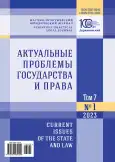Abstract
The main stages of the life path of Doctor of Law, Candidate of Historical Sciences, Professor Valery Grigoryevich Baev are highlighted. His contribution to the development of education in the Tambov region was noted both in the course of scientific, pedagogical activities, and as a result of administrative work in state and local government bodies. Attention is paid to the applied V.G. Baev pedagogical methods based on the interactive format of the relationship between the teacher and the student, the involvement in the educational process of the most prominent representatives of practical jurisprudence, as well as Russian and foreign scientists, the use of works of fiction and cinematographic art to discuss ethical issues of professional activity of a lawyer. In particular, it was noted that practical classes became a platform for scientific discussions, as well as discussions of ethical problems of the legal profession, when each student in the group was a participant in them, and the axiological approach to the study of law formed an awareness of its unconditional authority and significance, which happened through acquaintance with the world masterpieces of domestic and foreign literature and cinematography, helped education of a comprehensively developed personality. The scientific works of the scientist devoted to the peculiarities of German constitutionalism of the second half of the 19th – first half of the 20th century are analyzed.








